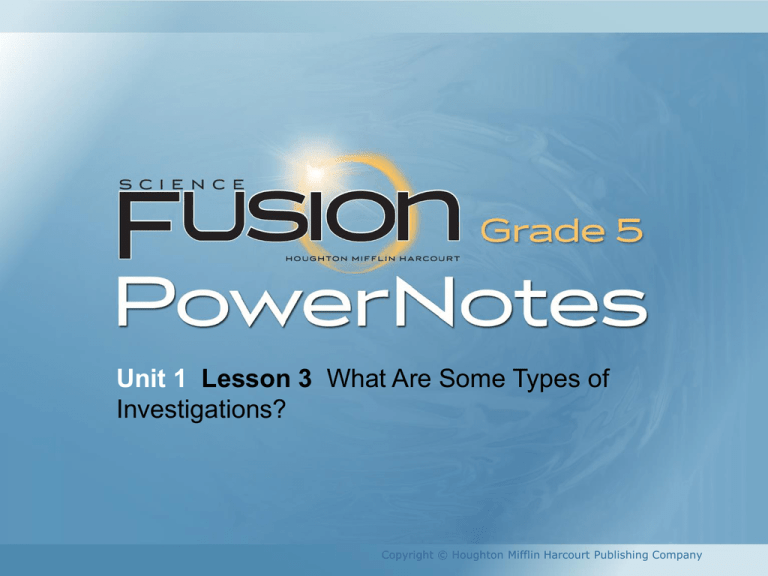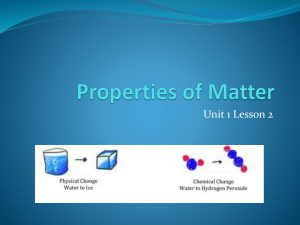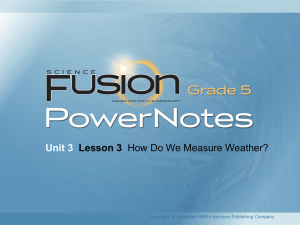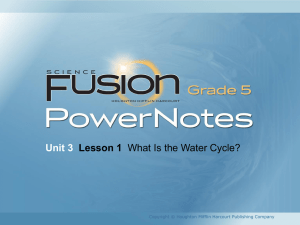Unit 1 Lesson 3
advertisement

Unit 1 Lesson 3 What Are Some Types of Investigations? Copyright © Houghton Mifflin Harcourt Publishing Company Unit 1 Lesson 3 What Are Some Types of Investigations? Florida Benchmarks • SC.5.N.1.1 Define a problem, use appropriate reference materials to support scientific understanding, plan and carry out scientific investigations of various types such as: systematic observations, experiments requiring the identificiation of variables, collecting and organizing data, interpreting data in charts, tables, and graphics, analyze information, make predictions, and defend conclusions. • SC.5.N.1.2 Explain the difference between an experiment and other types of scientific investigation. Copyright © Houghton Mifflin Harcourt Publishing Company Unit 1 Lesson 3 What Are Some Types of Investigations? Florida Benchmarks • SC.5.N.1.3 Recognize and explain the need for repeated experimental trials. • SC.5.N.1.4 Identify a control group and explain its importance in an experiment. • SC.5.N.1.5 Recognize and explain that authentic scientific investigation frequently does not parallel the steps of “the scientific method.” Copyright © Houghton Mifflin Harcourt Publishing Company Unit 1 Lesson 3 What Are Some Types of Investigations? A Process for Science Start with a Question • A scientific investigation always begins with a question. • Scientists observe the world and then ask good questions based on their observations. Copyright © Houghton Mifflin Harcourt Publishing Company Unit 1 Lesson 3 What Are Some Types of Investigations? Plan an Investigation • Scientific methods are ways that scientists perform investigations. • Investigations can be planned once a scientist has a testable question. • There are different scientific methods for investigating the world. Copyright © Houghton Mifflin Harcourt Publishing Company Unit 1 Lesson 3 What Are Some Types of Investigations? Investigations Differ • The method a scientist uses to conduct an investigation depends on the question being investigated. • An investigation in which all of the conditions are controlled is called an experiment. Copyright © Houghton Mifflin Harcourt Publishing Company Unit 1 Lesson 3 What Are Some Types of Investigations? Investigations Differ • Scientists use models to represent real objects or processes. • Repeated observations allow scientists to study processes in nature that they can observe but can’t control. Copyright © Houghton Mifflin Harcourt Publishing Company Unit 1 Lesson 3 What Are Some Types of Investigations? Drawing Conclusions • Whatever scientific methods are used, scientists will have results they can use to draw conclusions. • Conclusions may answer the question a scientist asked before they began. • Conclusions may also point to new questions and ideas for more investigations. Copyright © Houghton Mifflin Harcourt Publishing Company Unit 1 Lesson 3 What Are Some Types of Investigations? Explosive Observations • Some science questions are too big, too far away, or too uncontrollable for experiments. • These science questions can only be answered by making repeated observations. • Observations can be used to predict a future event. Copyright © Houghton Mifflin Harcourt Publishing Company Unit 1 Lesson 3 What Are Some Types of Investigations? Explosive Observations • How do scientists predict the locations for future volcanic eruptions? Copyright © Houghton Mifflin Harcourt Publishing Company Unit 1 Lesson 3 What Are Some Types of Investigations? Super Models When Modeling Is Needed • Models are used when scientists cannot experiment with the real object or event. • The better a model represents the real thing, the more useful it is. Copyright © Houghton Mifflin Harcourt Publishing Company Unit 1 Lesson 3 What Are Some Types of Investigations? Types of Models • Physical models can be created to simulate a real object or event. • Computer simulation models can be used to see what might happen in the future or to guess what happened in the past. • Diagrams and flowcharts are two-dimensional models used to show how ideas are related. Copyright © Houghton Mifflin Harcourt Publishing Company Unit 1 Lesson 3 What Are Some Types of Investigations? How to Excel in Experimentation Ask Questions • Scientific questions can be answered by doing experiments. An experiment is a procedure used to test a hypothesis. • It is a good idea to make some observations before stating a hypothesis. Copyright © Houghton Mifflin Harcourt Publishing Company Unit 1 Lesson 3 What Are Some Types of Investigations? Hypothesize • A hypothesis is a statement that can be tested and explains what can happen in an investigation. • Thinking about what you already know, talking to other people, and doing research can help you form a hypothesis. Copyright © Houghton Mifflin Harcourt Publishing Company Unit 1 Lesson 3 What Are Some Types of Investigations? Design an Experiment • Experiments can have two or more setups for comparing results. • Variables are any condition in an experiment that can be changed. Only one variable is tested. • The control is the setup to which all other setups will be compared. Copyright © Houghton Mifflin Harcourt Publishing Company Unit 1 Lesson 3 What Are Some Types of Investigations? Carry Out the Procedure • A procedure is the steps a scientist follows in an experiment. • Procedures are often repeated. • By repeating procedures, scientists will have more evidence to support their conclusions. Copyright © Houghton Mifflin Harcourt Publishing Company Unit 1 Lesson 3 What Are Some Types of Investigations? Record and Analyze Data • Recording data correctly is important. There are many ways to record data. • Once data are recorded, you can analyze the results to draw conclusions. Copyright © Houghton Mifflin Harcourt Publishing Company Unit 1 Lesson 3 What Are Some Types of Investigations? Draw Conclusions and Evaluate the Hypothesis • All conclusions must be supported with evidence. • The more evidence you have, the stronger your conclusion. • Evaluate your hypothesis after you have reached a conclusion. Copyright © Houghton Mifflin Harcourt Publishing Company Unit 1 Lesson 3 What Are Some Types of Investigations? Draw Conclusions and Evaluate the Hypothesis • Once you have drawn conclusions, decide if the hypothesis is supported or not. • Scientists build on what they learn by rethinking their hypothesis or designing new experiments. Copyright © Houghton Mifflin Harcourt Publishing Company Unit 1 Lesson 3 What Are Some Types of Investigations? Special Delivery: Data Displays • Line graphs are used to show change over time. • Circle graphs are used to compare parts to the whole. Copyright © Houghton Mifflin Harcourt Publishing Company Unit 1 Lesson 3 What Are Some Types of Investigations? Special Delivery: Data Displays • Diagrams are used to show data that do not include numbers. • Bar graphs are used to compare things or groups of things. Copyright © Houghton Mifflin Harcourt Publishing Company







